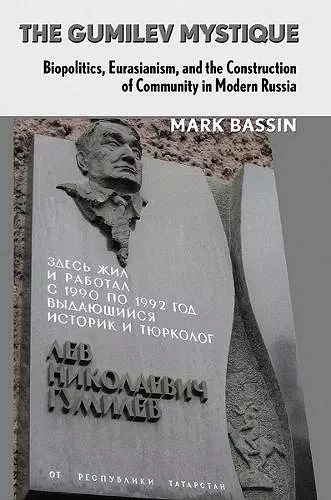The Gumilev Mystique
Biopolitics, Eurasianism, and the Construction of Community in Modern Russia
Format:Paperback
Publisher:Cornell University Press
Published:4th Feb '16
Currently unavailable, and unfortunately no date known when it will be back
This paperback is available in another edition too:
- Hardback£120.00(9780801445941)

Since the collapse of the Soviet Union, the legacy of the historian, ethnographer, and geographer Lev Nikolaevich Gumilev (1912–1992) has attracted extraordinary interest in Russia and beyond. The son of two of modern Russia's greatest poets, Nikolai Gumilev and Anna Akhmatova, Gumilev spent thirteen years in Stalinist prison camps, and after his release in 1956 remained officially outcast and professionally shunned. Out of the tumult of perestroika, however, his writings began to attract attention and he himself became a well-known and popular figure. Despite his highly controversial (and often contradictory) views about the meaning of Russian history, the nature of ethnicity, and the dynamics of interethnic relations, Gumilev now enjoys a degree of admiration and adulation matched by few if any other public intellectual figures in the former Soviet Union. He is freely compared to Albert Einstein and Karl Marx, and his works today sell millions of copies and have been adopted as official textbooks in Russian high schools. Universities and mountain peaks alike are named in his honor, and a statue of him adorns a prominent thoroughfare in a major city. Leading politicians, President Vladimir Putin very much included, are unstinting in their deep appreciation for his legacy, and one of the most important foreign-policy projects of the Russian government today is clearly inspired by his particular vision of how the Eurasian peoples formed a historical community.
In The Gumilev Mystique, Mark Bassin presents an analysis of this remarkable phenomenon. He investigates the complex structure of Gumilev's theories, revealing how they reflected and helped shape a variety of academic as well as political and social discourses in the USSR, and he traces how his authority has grown yet greater across the former Soviet Union. The themes he highlights while untangling Gumilev's complicated web of influence are critical to understanding the political, intellectual, and ethno-national dynamics of Russian society from the age of Stalin to the present day.
"The Gumilev Mystique is by far the most authoritative account in English on the ideas and life of a scholar whose star is still rising in Eurasia. In this widely researched book, Mark Bassin explains the popularity of Gumilev and explores the process by which a somewhat repressed figure in the Stalinist period became a guru of the post-Soviet period. The book reads extremely well and has a quality to it that makes the reader want to know what will come next from this outlandish figure whose real life is stranger than fiction." -- David G. Anderson, University of Aberdeen, author of Identity and Ecology in Arctic Siberia: The Number One Reindeer Brigade
"A son of two great Russian poets and an inmate of Stalin's Gulag, Lev Gumilev was the founding father of neo-Eurasianism, a powerful ideological framework for claiming Russia's special civilization and for justifying its predominance on the territory of the USSR. In tracing the origins and transformation of Gumilev’s theories, this book provides the best available explanation of the appeal of neo-Eurasianism in Russia,including among its top political leaders." -- Vera Tolz-Zilitinkevic, University of Manchester, author of Russia’s Own Orient: The Politics of Identity and Oriental Studies in the Late Imperial and Early Soviet Periods
"In 1996, the government of independent Kazakhstan named a new university after him. In 2005, the capital of Tatarstan commemorated his work by erecting a statue in the middle of Kazan. There is a mountain peak in the Altai range and a street in the Kalmyk Elista named after him. A son of Russia's two major poets, a prisoner of the Gulag, a celebrity historian, and a key figure behind the revival of the Eurasianist movement, Lev Gumilev was the man who provided postsocialist nationalisms with a conceptual lexicon and theoretical models. In this lucid and informative book, Mark Bassin meticulously reconstructs historical details, social networks, and intellectual contexts that shaped Gumilev's essentializing theory of 'biological communities’ and their ethnogenesis. The Gumilev Mystique is an important and timely biography of the ideas that continue to constitute the theoretical core of nation building processes in postcommunist societies." -- Serguei Alex. Oushakine, Princeton University, author of The Patriotism of Despair: Nation, War, and Loss in Russia
- Runner-up for Reginald Zelnik Book Prize in History 2017 (United States)
ISBN: 9781501702716
Dimensions: 229mm x 152mm x 27mm
Weight: 907g
400 pages